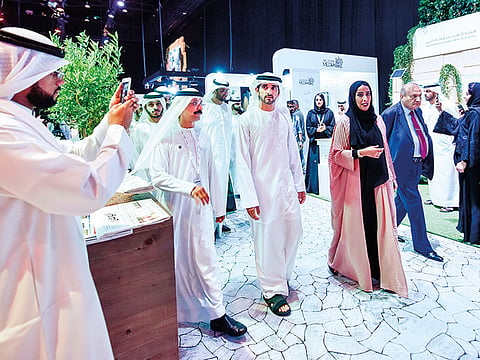Arab nations need to establish joint armed forces: Arab League chief
This is the Arab world’s “darkest” period in history, says Ahmad Aboul Geith

Dubai: Creating a unified objective among Arab nations and discussing the need of establishing joint armed forces in the region was the main highlight of the opening session of the 16th edition of the Arab Media Forum (AMF) held at Madinat Jumeirah on Monday.
The forum, which was held under the theme ‘Civil Dialogue,’ was inaugurated by Shaikh Hamdan Bin Mohamed Bin Rashid Al Maktoum, Crown Prince of Dubai, with a number of top official and prominent media personalities attending.
The annual forum hosted over 3,000 prominent media leaders, scholars and writers, who gathered to discuss the role of media in promoting civil dialogue through highlighting the important elements of peaceful coexistence, tolerance, and mutual respect.
Participants and experts in the media industry attending the two-day summit are taking part in a series of sessions related to changes in regional affairs and the importance of enhancing civil dialogue between the Arab nations.
Ahmad Aboul Gheit, Secretary-General of the Arab League, who gave the keynote speech at the opening, described the present time as the Arab world’s “darkest” period in history.
Recalling a number of civil wars taking place in the region, including that in Yemen and Syria, he referred to the 45 million Syrian refugees, the 500,000 deaths, and five million internally displaced people in Syira as the result of fragmentation between nations and foreign intervention.
“We as Arab nations have a lot in common such as language and culture, but we don’t appreciate our common ground, and have failed to understand our full potential and strength. Under this fragmentation, national interests will be lost and we will continue to live in these wars, deaths, and divisions for another century. We must not let this happen,” said Gheit.
The Secretary-General called on Arab nations to work on building combined efforts to create joined military and peace keeping forces through a coalition, pointing out this is a critical time for the region.
“We must wake up and face and confront challenges such as foreign intervention in our affairs. We need to create a dialogue between the Arab nations and reconcile among ourselves so that we stop foreign intervention from manipulating our nations,” said Gheit.
He criticised states who give themselves the right to defend one Muslim sect against the other on Arab land, creating civil war.
He further referred to Arab nation’s neighbouring countries Israel and Iran, pointing out their influence and interference with Arab affairs. “I believe these are the happiest moments for Israel and Iran who are enjoying the present situation in the Arab world, and believing they have control over the decision-making process. This is unacceptable, and we must unite and restore peace in the region,” said Gheit.
Recalling Syria’s reputation as the “heart of the Arab nation,”, and Iraq as the “Western wing of the Arab nation,” Gheit highlighted the Arab League is a reflection of Arab will and Arab reality.
He noted that with the Arab world’s combined GDP of $2.3 trillion (Dh3.4 trillion), and large amount of resources including 20-25 million gallons of gas per day, Arab nations are capable of overcoming their challenges by uniting and combining their resources.
Along with a common objective and joint military force, Gheit explained that Arab nations are desperately in need of fighting terrorism and extremism, which is especially common among their youth. He described extremists as people with an “obsessive mentality” that leads them to commit suicide.
“Fighting Daesh and extremism requires a number of concepts that go beyond military forces. It starts with education in our countries, and by revising the media framework that could control this message, which is sabotaging young people’s minds. We can also combat terrorism through economic development, which will give youth opportunities,” he said.
Gheit concluded by emphasising the Arab League was still capable of achieving progress. “The Arab League is capable of serving the Arab nation if given the chance to be highly active. The future is bright, there is hope,” said Gheit.
Meanwhile, Mona Al Merri, Chairperson of the AMF organising committee and president of the Dubai Press Club, highlighted the media’s role and responsibility in restoring peace in the Arab world. She also called for a unified objective among all Arab media to ensure their mission is based on a message of peace, tolerance, and mutual respect.
Earlier, Noura Al Kaabi, Minister of State for Federal National Council Affairs, kicked off the forum discussing the responsibilities and the role of media in their own environment and worldwide, pointing out the importance of constructive dialogue and its influence on public opinion.
She pointed out the challenging times facing the Arab world, calling on journalists to ensure they are reflecting the truth in the media.
She also referred to His Highness Shaikh Mohammad Bin Rashid Al Maktoum, Vice-President and Prime Minister of the UAE, and the Ruler of Dubai’s direct and positive approach when conversing with public through social media. “He makes announcements and informs the public of certain decisions directly through social media,” she said.
Al Kaabi also called on youth to ask questions and start debates on the challenges they were facing. She discussed the ways in which universities, schools and the society can encourage investigative journalism among youth.



